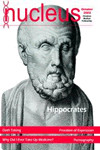The author of a recent editorial in the Student BMJ suggested that it is time for medics to abandon the 'pretence of morality' involved in the tradition of ceremonial oath taking.[1] He argues that morals are not fixed but change with shifts in cultural values, and that swearing a generic oath is inappropriate anyway as it cannot encompass the values of all the oath takers.
Whilst he is right that merely reciting an oath is unlikely to have a major impact on the participants' medical practice, he seems to be bucking an increasing trend: there is a resurgence of interest in medical oaths and codes. About half of UK medical schools and almost all those in the USA have oath ceremonies for students either on admission or graduation.[2] Some use a modernised Hippocratic Oath; others use the Declaration of Geneva, whilst some schools have devised their own.[3]
What is an oath?
Medicine is unique in its use of oath swearing. Perhaps this is because, in a moral sense, medicine is qualitatively different from most other professions, not least because of the responsibilities doctors bear for their patients.
According to the Oxford English Dictionary, an oath is, 'A solemn or formal appeal to God (or a deity or something held in reverence or regard), in witness of the truth of a statement, or the binding character of a promise or undertaking.'
For the author Daniel P Sulmasy, an oath is 'a very special kind of promise'; he says that oaths carry more moral weight than promises: they are frequently validated by something that transcends the swearer (such as a deity) and, because of their public nature, involve the swearer in a deeper way. JL Austin describes oaths as 'performative utterances'[4] - by taking an oath, doctors can make their intentions clear in a public setting, but also before God.
A brief history
Individuals entering medicine have taken vows for at least 2,500 years.[5] Perhaps the most famous oath is that of Hippocrates. The origins of this text remain unclear but its legacy has persisted.
Although some medical students still swear the Hippocratic Oath, the last few centuries have seen the introduction of several alternative codes, perhaps most significantly the Declaration of Geneva (1948). Some of these arose in response to the atrocities in Nazi Germany during the Second World War, but although they may be based on the Hippocratic Oath, nearly all make significant omissions, perhaps most notably the decline of commitment to the sanctity of life before birth.
Why swear an oath?
Proponents of medical oaths cite many reasons why they are good for the medical profession. For some, it is an opportunity to declare their morality, instilling faith and confidence in the patient.[6] However, medical oaths can only be statements of intention; they cannot predict the future: doctors have and will fail to live up to their standards.
There are many theories about the recent increase in oath taking but it seems unlikely that doctors have suddenly become more morally conscientious, even if medicine became more ethically complex during the latter part of the 20th century. The profession is also no longer considered sacrosanct: goodbye paternalism, hello healthcare consumers. Recent high profile stories such as the Harold Shipman case have done little to boost the public's confidence. Perhaps there is some moral ground to be reclaimed and a need to demonstrate to the public that doctors are accountable to ethical principles.
The place of oaths today
Given the diversity of beliefs and value systems held by medics, it would be impossible to draw up a meaningful oath that everyone could subscribe to. Many thus argue that medical oaths are no longer relevant. What should our stance be as Christians?
Matthew told the readers of his gospel not to 'swear'; he said that they should let their 'yes' be yes, and their 'no' no.[7] However, he is unlikely to have been condemning the taking of solemn oaths such as God's before Abraham,[8] but more the flippant use of God's name to guarantee what was spoken, and a culture of dishonesty where such oaths were necessary. Indeed, the Christian faith is packed with 'performative utterances', from baptism to marriage to communion services. Each of these is symbolic and serves as a reminder of our earthly relationships but, more importantly, our relationship with our Father. It may be that our moral values differ markedly from those of our contemporaries but this should not stop us from medical oath taking in its truest sense: making a pledge before God. In his article on Hippocratic medicine (pp14-21), John Patrick reminds us of our responsibility as Christian doctors - this is even more important than our duty to patients and colleagues.[9] Whilst an appropriate oath cannot guarantee that we won't stumble, we could do worse than pledging to face the moral challenges of medicine together as children of God.
































